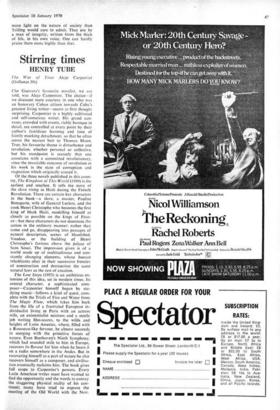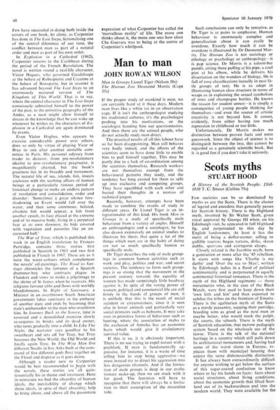Stirring times
HENRY TUBE
The War of Time Alejo Carpentier (Gollancz 30s)
Che Guevara's favourite novelist, we are told, was Alejo Carpentier. The choice—if we discount mere courtesy in one who was an honorary Cuban citizen towards Cuba's greatest living writer—seems at first thought surprising. Carpentier is a highly cultivated and self-conscious writer. His grand can- vases, crowded with events, richly baroque in detail, are controlled at every point by their author's fastidious learning and tone of faintly mocking detachment, so that he often seems the nearest heir to Thomas Mann. True, his favourite theme is disturbance and revolution, whether personal or collective, but his standpoint is scarcely that one associates with a committed revolutionary, since the invariable outcome of revolution in his work is the state of corruption and stagnation which originally caused it.
Of the three novels published in this coun- try, The Kingdom of This World (1949) is the earliest and smallest. It tells the story of the slave rising in Haiti during the French Revolution. There are certain key characters in the book—a slave, a master, Pauline Bonaparte, wife of General Leclerc, and the cook Henri Christophe who becomes the first king of black Haiti, modelling himself as closely as possible on the kings of Fran- ce—but these characters do not dominate the action in the ordinary manner; rather they come and go, disappearing into passages of natural description, scenes of bloodshed, Voodoo, or the building of Henri Christophe's fortress above the palace of Sans Souci. The impression given is of a world made up of multitudinous and con- stantly changing elements, whose human inhabitants obey in their successive frenzies of construction and destruction the same natural laws as the rest of creation.
The Lost Steps (1953) is an ambitious ex- tension of this idea, set in modern times. Its central character, a sophisticated com- poser—Carpentier himself began by stu- dying music—follows a kind of quest, com- plete with the Trials of Fire and Water from The Magic Flute, which takes him back from the life of a frustrated European in- dividualist living in Paris with an actress wife, an existentialist mistress and a sterile job writing film-scores, to the wilds and heights of Latin America, where, filled with a Rousseau-like fervour, he almost succeeds in merging with the primitive forces of nature. Even Beethoven's Ninth Symphony, which had sounded stale to him in Europe, recovers its flavour for him when he hears it on a radio somewhere in the Andes. But in recovering himself as a part of nature he also recovers himself as a composer, and civilisa- tion eventually reclaims him. The book gives full scope to Carpentier's powers. Every Latin American writer must have wanted to find the opportunity and the words to convey the staggering physical reality of his con- tinent; many have tried to express the meeting of the Old World with the New.
Few have succeeded in doing both inside the covers of one book, let alone, as Carpentier has done in The Lost Steps, fictionalising one of the central dilemmas of our time, the conflict between man as part of a natural order and man as part of his own order.
In Explosion in a Cathedral (1962), Carpentier returns to the Caribbean during the period of the French Revolution. The novel is written round a real-life character, Victor Hugues, who governed Guadeloupe at the behest of Robespierre and Cayenne at the behest of Bonaparte, but in manner it has advanced beyond The Lost Steps to an enormously matured version of The Kingdom of This World. That is to say, where the central character in The Lost Steps consciously submitted himself to the power of the past, to the primitive geography of the Andes, as a man might allow himself to dream in the knowledge that he can wake up whenever he wishes to, the characters of Ex- plosion in a Cathedral are again dominated by events.
Even Victor Hughes, who appears to exercise considerable power over others, does so only by virtue of playing Vicar of Bray to one after another unstable com- mittee in Paris. His personal odyssey from trader to dictator, from pre-revolutionary idealist to post-revolutionary pragmatist, is magnificently charted, but the book's greatness lies in its breadth and movement. The natural life of sea, islands, fish, insects coalesces with the seething affairs of human beings at a particularly riotous period of historical change to make an endless pattern of revolution and consolidation, order and disorder: 'Sometimes a great silence fore- shadowing an Event would fall over the water, and then some enormous, belated, obsolete fish would appear, a fish from another epoch, its face placed at the extreme end of its massive body, living in a perpetual fear at its own slowness, its hide covered with vegetation and parasites like an un- careened hull.'
The War of Time, which is published this week in an English translation by Frances Partridge, contains three stories first published in Spanish in 1963 and two first published in French in 1967. These are as it were the water-colours which complement the novels' oil-paintings. The Road to San- tiago chronicles the fortunes of a Spanish drummer-boy who contracts plague in Flanders and vows to make a pilgrimage to the shrine of St James when he recovers. His religious fervour ebbs and flows with worldly blandishments. In Right of Sanctuary, a Minister in an overthrown South American government takes sanctuary in the embassy of another state and ends by becoming that state's ambassador to the man who overthrew him. In Journey Back to the Source, time is reversed and a demolished mansion slowly re-acquires its bricks and its dead owner, who turns gradually into a child. In Like The Night, the narrator says goodbye to his sweetheart and sets off for Troy, but Troy becomes the New World, the Old World and finally again Troy. In The Wise Men five different Noahs in five Arks built at the com- mand of five different gods float together on the Flood and disperse as it goes down.
Although a reader new to Carpentier would be best recommended to begin with the novels, these stories are all quin- tessentially his in theme and treatment. Here in miniature we find the absurdity of human ideals, the inevitability of change which those ideals, in spite of their absurdity, help to bring about, and above all the passionate expression of what Carpentier has called the 'marvellous reality' of life. The more one thinks about it, the more one sees how close Che Guevara was to being at the centre of Carpentier's whirlpool.



































 Previous page
Previous page